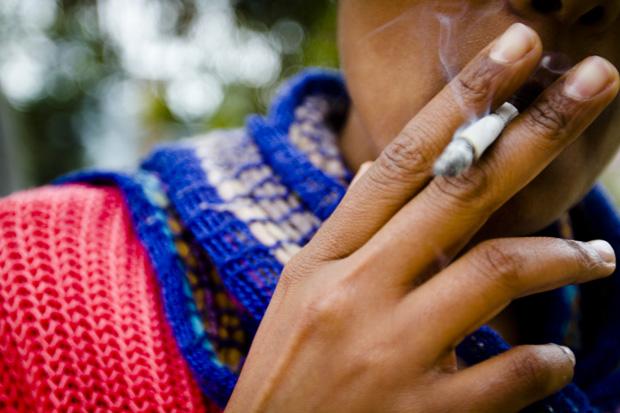
Smokers may end up funding the CSU and UC systems if a new tax initiative passes next year. Photo Illustration by Charlie Kaijo / Senior Photographer
A new initiative has been proposed to raise the tax on a pack of cigarettes in an effort to raise money for financial aid at California State University and University of California schools.
The California Residents College Accessibility and Affordability Act of 2014, which is set to go on the November 2014 ballot and would go into effect in the 2015-16 academic year, would increase the tax by $1 for every pack of 20 cigarettes and the money would then be deposited into a special fund, said Ian Johnson, financial analyst at the California Department of Finance.
?I think the special fund would be called the California Residents College Accessibility and Affordability fund and the fund would essentially be used for the purpose of expanding financial aid for California residents at UCs and CSUs,? he said.
The purpose of the California Residents College Accessibility and Affordability act is to ?increase the tax on tobacco to preserve and protect California?s public university system.?
Debra Hendricks, senior sociology major, said she would vote for an initiative like this because of what it might do.
??I?ve lost a lost of people to smoking and you can?t get make them stop,? Hendricks said. ?If something like this can possibly help people quit then I?m all for it.?
In terms of generated revenue, Johnson said the initiative is projected to create $800 million in the first year it goes into effect.
?There would be slightly declining revenues each year thereafter based on declining cigarette consumption projections,? he said. ?Our Demographics and Research unit does a number of projections on things statewide and has found that in coming years there will be a decline in cigarette consumption.?
Hendricks said the idea of having the tax contribute to financial aid is a smart idea and if it helps lessen smoking then it is even better.
?I think it?s great but at the same time people choose what they want to do,? she said. ?I mean, do we tax people for doing what they want, I don?t know.?
Jessica Fuentes, junior biology major, likes the idea of taxing more for cigarettes.
?I don?t like smoke and there?s enough as in L.A. as it is, so if it would mean less smoke, then I like it,? she said. ?The fact that the tax would mean more financial aid makes it even better.?
From the projected $800 million revenue, there is an estimated loss of $70 million to programs that receive proceeds from existing excise taxes on tobacco companies, which Johnson said are used for tobacco education and prevention, tobacco-related disease research, breast cancer screenings for uninsured women and early childhood education.
This leaves $730 million to be distributed for financial aid by the California Student Aid Commission, which is the state entity that administers financial aid, Johnson said.
An independent financial accountability committee will be in charge of reviewing the audit of the California Residents College Accessibility and Affordability fund and will then create a public report based on ?the financial practices and performance of the California Student Aid Commission,? according to the proposal.
The initiative has to go to the Board of Equalization where they estimate the impact this new excise tax would have on other programs that currently depend on tobacco consumption proceeds, Johnson said.
?If the board were to determine, based on their projections, that this new tax would have a negative impact on the amount of tobacco consumed in the state enough that it would have a negative impact on the revenue generated from tobacco consumption, the first call on these funds that are raised would be to make those other programs whole before the revenue generated could be spent on financial aid,? he said.
Sen. Bob Huff (R-Diamond Bar) said the focus should not be another tax increase that has already been rejected several times.
?The people of California voted to increase taxes by $50 billion and Gov. Jerry Brown promised students that this money would go to education,? Huff said. ?Since the governor has only directed 50 percent of this money to education, the question students need to ask is, what happened to the rest of the money.?
Fuentes is not sure if another cigarette tax proposal would pass but thinks the financial aid aspect definitely makes it more appealing.
?There?s so much going on with smoking and cancer that (an initiative) like this might make a difference and make people more aware of cancer,? she said.
Johnson said the initiative is somewhat vague with what ?expanding financial aid? actually means.
?There is a requirement that in expanding financial aid the California Student Aid Commission is required to supplement, not supplant, the current state financial aid,? he said. ?Supplementing existing state funding for financial aid means the state cannot decrease the amount of General Fund provided for financial aid and backfill the same amount with this new College Accessibility funding.?
Star Wars citizens bank Hansel and Gretel LGBT Giovanna Plowman martin luther king jr quotes Inauguration 2013
No comments:
Post a Comment
Note: Only a member of this blog may post a comment.